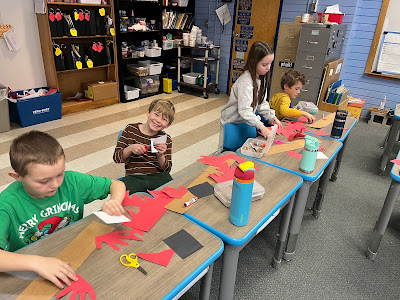It is hard to believe that this is the last post of 2024! Like most people, Mrs. Underwood, Ms. Morse and I find ourselves wondering how another year has passed so quickly. And, like some people, we find ourselves taking time to reflect upon the paths that we traveled on this trip "once around the sun". There are many things that we are thankful for in 2024, including our families, our friends, and our health. We are hugely thankful for the opportunity to teach your children at Woodstock Elementary School. Each day we learn as much from them as they learn from us, and it is this type of connection with our students that makes first grade such a fulfilling place to spend our days. We appreciate all you do to support your children in their learning and readiness for whatever the day brings, and we honor the trust that you place in us to guide their development as learners and as people. This post sends our best wishes for a happy, safe, and peaceful new year.
















